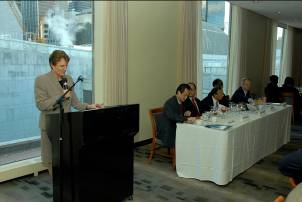
The Words of the Smith Family

|
|
The Words of the Smith Family |
|
UPF joins UN launch of ‘Global Media Compact’ to Aid Least Developed Countries
Karen Judd-Smith
October 27, 2006
UPF Director, Office of UN Relations
New York, United States

.Karen Judd Smith, Director of UPF’s UN Office welcomes the guests and moderates the luncheon.
This week in New York, the UPF and MediaGlobal cosponsored the United Nations launch of the ‘Global Media Compact,’ a wide ranging effort to increase public awareness of the plight of the world's 50 poorest nations, and to provide direct education and assistance to a new generation of leaders.
Announcing the launch before a large gathering of Ambassadors, diplomats, NGOs and the media, UN envoy Anwarul K. Chowdhury appealed to editors and owners of newspapers to feature stories that would raise international awareness of the issues of poverty, disease and hunger prevalent in these countries.
"It is unfortunate that the voice of the poor continues to be marginalized," said Chowdhury, who is the UN High Representative for Least Developed Countries (LDCs), Landlocked Developing Countries and Small Island Developing States. "There is a need for increased focus on the everyday challenges facing millions of impoverished people. Their needs ought to be placed at the forefront of the global development agenda."
Nosh Nalavala, Executive Director of MediaGlobal, said that the compact would bring together editors of newspapers to advance the cause of human development and help their readership understand the suffering of the poor. Nalavala urged those present to follow the lead of the UPF and make development issues a much higher priority.
"Today much of the media offers an unbalanced coverage of developing countries in Africa and Asia," he said. "With this Compact we hope to engage powerful media organizations as partners, and break the stereotypes.
Members of the global compact will be asked to commit themselves to a seven-point program including "making alleviation of poverty, disease and hunger in poor and vulnerable countries a vital corporate priority," according to a release from Mr. Chowdhury’s office. "The Compact is not a regulatory initiative. It relies on editors and broadcasters to recognize the constraints of poor people in vulnerable countries and give coverage in their respective media - print or electronic," the release emphasized.
The countries to be focused on initially include Burkina Faso, Burundi, Central African Republic, Chad, Ethiopia, Guinea-Bissau, Mali, Mozambique, Niger, and Sierra Leone, based on their ranking in the UN’s Human Development Index.
Mr. Yiping Zhou, Director of the UN Special Unit on South-South Cooperation (SU/SSC), underscored the importance of technologies that link the "tangibles of development with the intangible driving force of human ingenuity and education" and the significant role media has to help stimulate effective development.
Notably among the many media representatives in attendance was a large number of Chinese journalists, as well as those from a number of the target nations. Editor-in-Chief of United Press International (UPI) Michael Marshall said that the well-known wire service was seeking to strengthen its coverage of development issues.
Delegates listened carefully as Marshall introduced the UPI "journalist intern network" (JIN) pilot project as a promising way to provide LDCs with meaningful work opportunities for youth and as strategic effort that helps LDCs address the challenges of strengthening their emerging democracies. The first JIN project was successfully held in Afghanistan earlier this year, and the UPI is looking for partners to bring the intiative to more nations in 2007.
Mr. Kevin Pickard, captured the attention of the diplomatic and media audience as he introduced UPF’s cutting edge Web TV initiative, upTV.org, and the launch of the new Development Channel (Ch13) http://www.uptv.org/ch13.php as an innovative media tool for the UN, the LDCs and the Global Media Compact.
"The task ahead is too much for any one organization," said UPF Deputy Secretary General Taj Hamad in closing, "but if we commit to work together, we may hear great things of this initiative in the future."
Download entire page and pages related to it in ZIP format
Table of Contents
Information
Tparents Home